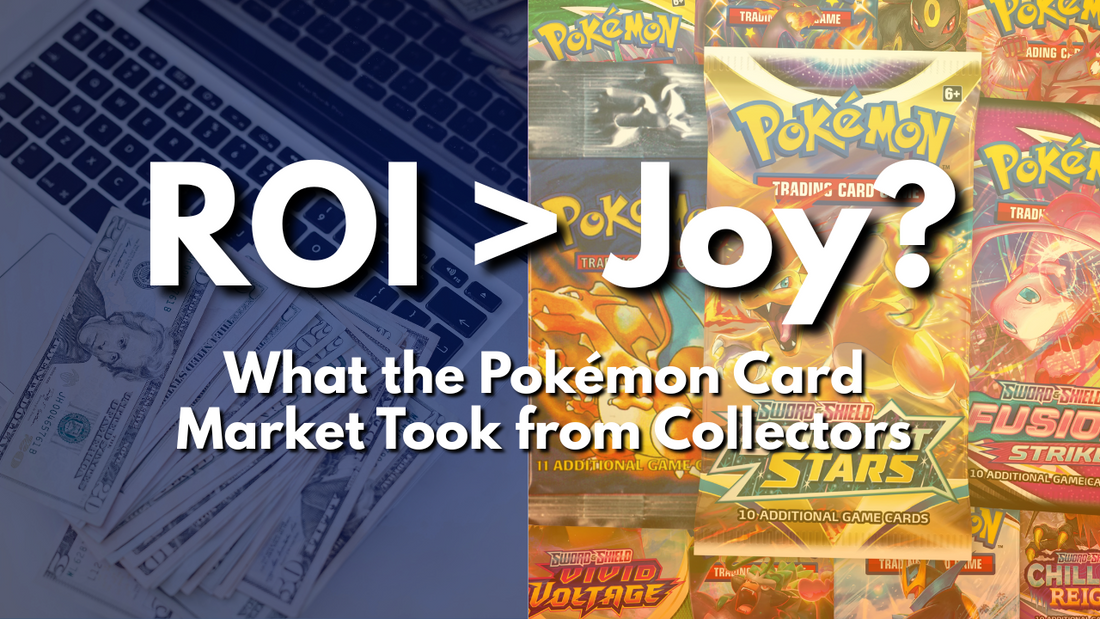
How the Pokémon Card Market Changed the Hobby
Share
Let’s be honest—Pokémon collecting doesn’t feel the same anymore.
It’s not just about pull rates or price spikes. It’s about how the hobby that once brought us joy and connection has slowly turned into a game of margins.
Somewhere along the way, Pokémon stopped feeling like a hobby—and started feeling like a stock market.
When the Pokémon Market Took Over the Hobby
Remember when you could grab a few booster packs at Target just because it was Tuesday?
Now, you’re lucky if the shelves aren’t wiped out by scalpers before the store even opens.
What used to be a community of collectors has shifted into an economy of investors. Every new Pokémon TCG set drops with hype, speculation, and resale panic. And the people who love this hobby...the ones who open packs, build decks, and complete binders—are the ones paying the price.
Scalpers have turned Pokémon into a fast-moving commodity, creating artificial scarcity and inflated prices that hurt genuine fans. Aggressive resale practices are threatening the future of the Pokémon card game, especially for local game stores and younger players just entering the scene.
Even longtime collectors are calling out the shift because this isn’t what made Pokémon special in the first place.
What Pokémon Collectors Are Really Losing
This isn’t just about access—it’s about experience.
When the chase becomes all about value, something sacred gets lost.
You feel the pressure to keep up.
You wonder if you’re falling behind.
You start asking, “Why am I even doing this?”
And when Pokémon turns into just another hustle, it pushes away the very people who made the community vibrant to begin with.
Reclaiming Pokémon for the Collectors
But here’s what’s still true: Pokémon can still make you feel something.
That spark before you flip the last card.
That smile when you see a Machamp that reminds you of your childhood deck.
That weird little peace that comes from sorting cards in silence.
In 2021, Logan Paul spent $5.275 million on a PSA 10 Pikachu Illustrator—not just because it’s rare, but because Pokémon taps into something deeper than cardboard.
The Pokémon brand has built an $80 billion empire by leaning into nostalgia—and we’re living proof that it works.
It’s not just marketing theory. Psychology tells us nostalgia increases optimism, resilience, and emotional grounding. That’s why we stay.
What Pokémon Collecting Looks Like Now
We’re not collecting for profit. We’re collecting for meaning.
Because for every overhyped reprint, there’s a card that brings us back to who we were.
For every overpriced box, there’s a binder page that makes us feel calm again.
For every toxic flip group, there’s a livestream that feels like family.
Understanding the emotional attachment to Pokémon cards helps explain why this hobby still matters. The psychology of collecting reminds us that it’s okay to collect slowly, intentionally, and with heart. And yes, even applications like Pokémon Home are reuniting players with long-lost companions, proving again that this franchise is built on connection.
TL;DR
Pokémon collecting has changed.
It’s noisier. Pricier. More market-driven than ever.
But the reason we started? That’s still here.
The binder builds.
The lucky pulls.
The feeling of being 9 years old again—even if just for a second.
Pokémon doesn’t belong to scalpers. It belongs to the community.
To the players.
To the collectors.
To the people who never stopped caring.
Let’s collect like it.
Related Post You’ll Love:
What Even Counts as a Hit Anymore?
Shop Packs for Our Next Live Break
Frequently Asked Questions (FAQ)
Why does Pokémon collecting feel so different now?
Because the hobby has become market-driven. It’s not just about opening packs anymore—it’s about reselling, flipping, and FOMO. And that shift has made it harder for everyday collectors to stay connected to the joy that brought them here in the first place.
Are scalpers really hurting the Pokémon community that much?
Yes. Scalpers create artificial scarcity, inflate prices, and make products harder to access for genuine fans. This doesn't just hurt wallets—it damages the sense of community and inclusion that makes Pokémon collecting special.
Is there still joy in collecting Pokémon cards as an adult?
Absolutely. But it takes more intention. You have to filter out the noise and focus on what actually brings you joy—whether that’s building a binder, chasing a nostalgic set, or just opening one pack a week because it feels good.
How do I avoid burnout in the Pokémon hobby?
Slow down. Collect what you love, not what the market says is hot. Take breaks when you need to. And connect with people who remind you that this hobby is about more than value—it’s about meaning.
Is Pokémon still worth collecting if I’m not flipping or grading?
100%. In fact, that might be the best reason to collect. Your cards don’t need to be investments to be valuable. They just need to matter to you.
How can I support the Pokémon community in a meaningful way?
Buy from creators and local game stores. Tune into live streams that are about fun, not just profit. Share the hobby with new collectors. And remind people that Pokémon is about connection, not competition.
